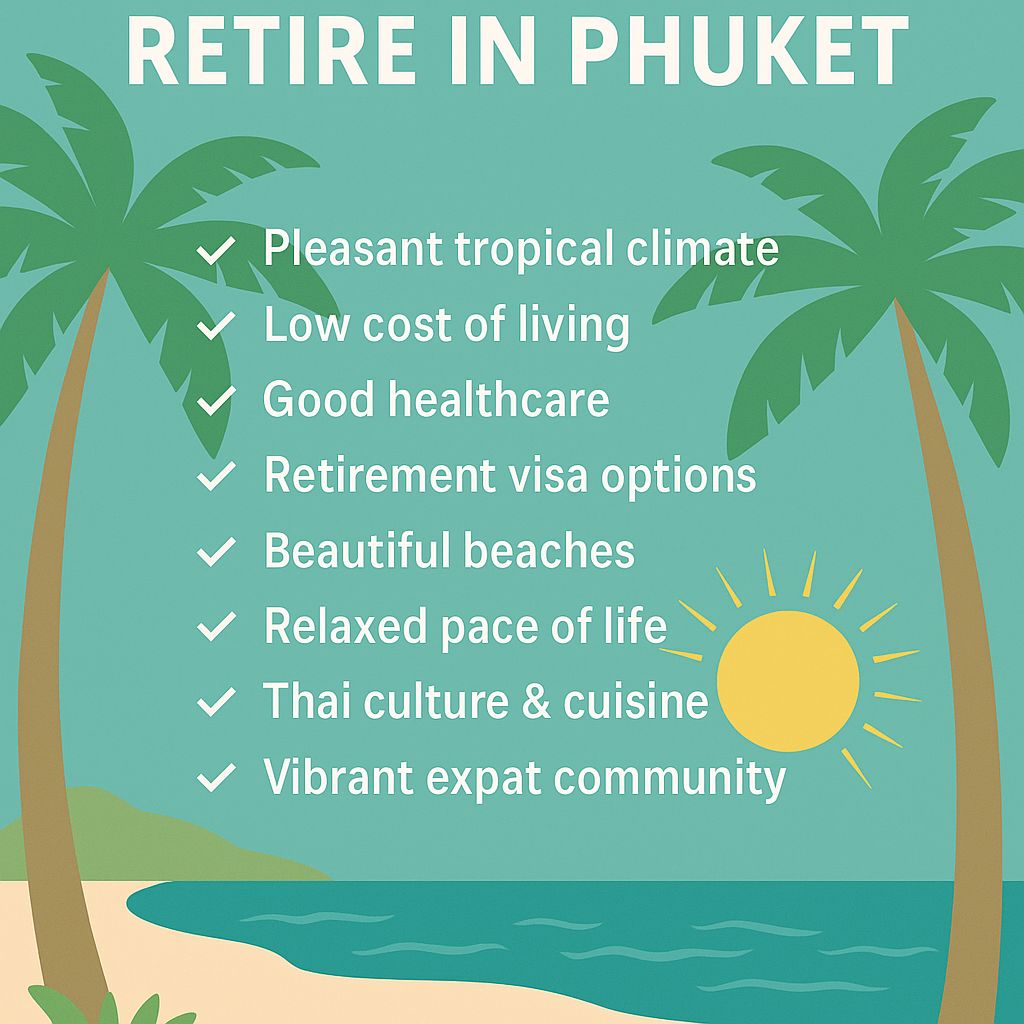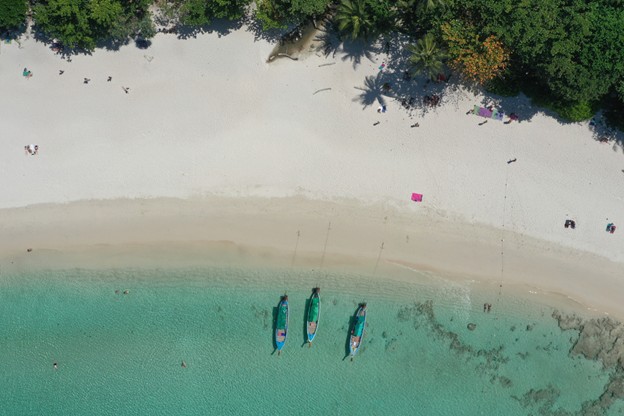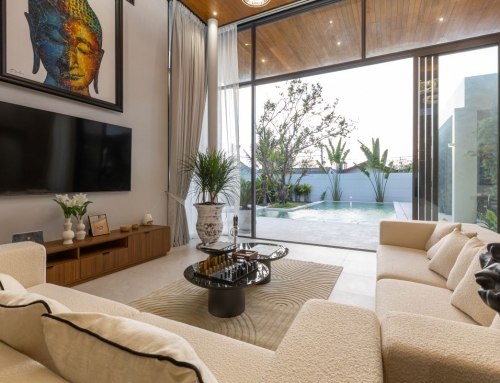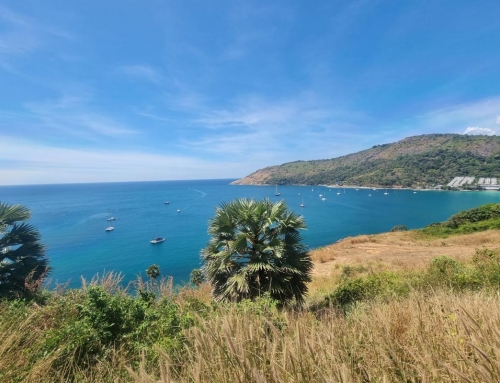This retiring in Phuket guide will walk you through everything you need to know, from the best areas for retirees to buy, costs, legal structures, and why Phuket consistently ranks as one of the world’s top retirement destinations.
Retirement in the tropics has become a dream for many, but nowhere offers the same mix of beauty, convenience, and affordability as Phuket. With its crystal-clear waters, year-round sunshine, and welcoming community, the island has become a global hub for retirees. But beyond the beaches and lifestyle lies one of the most attractive property markets in Asia.
Why Retire in Phuket?
For retirees, Phuket ticks every box:
-
Climate: Warm weather year-round with distinct dry and green seasons.
-
Healthcare: International-standard hospitals at far lower costs than the West.
-
Community: Thriving expat networks and international clubs.
-
Accessibility: A major international airport connecting you to Europe, Asia, and Australia.

Retirement Housing Options in Phuket
Condominiums: Stress-Free Living
Foreigners often prefer condos as they can be purchased freehold. Many developments are close to beaches, shops, and hospitals, ideal for retirees who want a lock-up-and-leave lifestyle. Prices start from under THB 4 million for a quality one-bedroom unit, with luxury options reaching THB 20-50 million. Some luxury condominium penthouses can even reach 160 million THB.
Pool Villas: Privacy and Space
For retirees seeking more space, Phuket’s villas are among the most attractive in Asia. Popular in areas like Rawai, Nai Harn, Chalong, and Bang Tao, villas offer gardens, pools, and privacy. Expect to pay THB 12-25 million for a mid-range three-bedroom villa, with ultra-luxury sea-view villas commanding much higher prices.
Resort-Style Residences
Phuket also has branded residences linked to international hotel groups. These offer rental management, concierge services, and resort-style amenities, a great choice for retirees who value convenience.
Best Areas in Phuket for Retirees
Different regions of Phuket suit different lifestyles. Here are the most popular:
-
Rawai & Nai Harn: Peaceful, green, and home to Phuket’s largest retiree community.
-
Chalong: Central and convenient, close to international schools and hospitals.
-
Bang Tao & Laguna: Upscale living with golf courses, beach clubs, and plenty to do.
-
Kata & Karon: Popular with those who enjoy a balance of beach life and amenities.
-
Kamala: A quieter option with plenty of attractions and a laid back beach.
Wherever you choose, this Retiring in Phuket guide makes it clear, the island offers homes for every lifestyle and budget.
Costs of Living and Owning Property in Phuket
While property is often the largest expense, day-to-day living is surprisingly affordable compared to Western countries.
-
Utilities: THB 3,000-5,000 per month depending on air-conditioning use.
-
Groceries: Local markets are inexpensive; imported products are higher.
-
Dining Out: Thai meals cost as little as THB 60–100; Western dishes THB 200-500.
-
Healthcare: A doctor’s consultation at a private hospital may cost THB 1,000-1,500.
Property ownership comes with low annual costs – common area fees for condos or modest upkeep for villas.
Legal Considerations for Retirees
Foreigners cannot directly own land in Thailand but can own:
-
Freehold condominiums (in developments where 51% remains Thai-owned).
-
Leasehold villas (30 years renewable).
-
Company structures (with legal advice).
Retirees should always seek legal guidance before purchasing.
Healthcare for Retirees in Phuket
Phuket is home to world-class hospitals such as:
-
Bangkok Hospital Phuket
-
Dibuk Hospital
-
Siriroj International Hospital
Many doctors speak English, and costs are a fraction of those in Europe or the U.S. This is one of the biggest reasons retirees choose Phuket over other destinations.

Retirement Visas in Thailand
Property buyers will need the right visa to stay long-term. The most common for retirees is the Non-Immigrant O-A or O-X visa, available to those aged 50+. Other options include:
-
Marriage visa (if married to a Thai national)
-
Thailand Elite Visa (long-term, but with higher fees)
While property purchase does not automatically grant residency, it often strengthens the case for long-term stay.
Day-to-Day Lifestyle for Retirees
Phuket offers a slower pace of life, focused on health, community, and the outdoors. Retirees often enjoy:
-
Morning walks at Nai Harn Lake
-
Swimming and yoga on the beach
-
Golf at world-class courses in Laguna or Kathu
-
Social clubs, language schools, and community events
This lifestyle balance makes Phuket one of the world’s most desirable retirement spots.

Phuket’s Growing Infrastructure
The island continues to modernize with:
-
Road expansions and new bypasses
- Upgraded marinas and yachting facilities
-
Expanding retail centres like Central Phuket
These investments add long-term value to property and make life easier for retirees.
FAQs – Retiring in Phuket Property Guide
1. Can foreigners own property in Phuket?
Yes, foreigners can own freehold condos and leasehold villas. Always consult a property lawyer for safe ownership methods.
2. Is Phuket affordable for retirees?
Yes, compared to Western countries, the cost of living and healthcare is significantly lower while offering excellent quality.
3. Which areas are best for retirees to buy property?
Rawai, Nai Harn, Chalong, Kamala, and Bang Tao are most popular with retirees.
4. What is the average budget for a retiree buying property?
Condos start around THB 4-6 million, while villas range from THB 12-25 million for mid-range options.
5. Does buying property help with visas?
No, but property ownership strengthens your profile for long-term retirement in Thailand.
Final Thoughts On Our Retiring in Phuket
Phuket offers more than sunshine and beaches, it provides a secure, affordable, and rewarding property market for retirees. Whether you dream of a sea-view condo, a private pool villa, or a low-maintenance apartment near the beach, Phuket has it all.
If you’re considering your next chapter abroad, this Retiring in Phuket property guide should be your starting point. With the right knowledge and guidance, your retirement home in the tropics is closer than you think.
Set Yourself Up for a Smooth Retirement in Phuket
Once you’ve chosen your preferred lifestyle and location, make sure the essentials are squared away. These guides will help you cover the practicalities:
Need personal guidance on long-term residency and the right ownership route? Contact us for expert, friendly advice on retiring in Phuket and finding your dream home.
Get in Touch | Call Now On: +66 9484 11918
Disclaimer: The information contained in this article is provided for general informational purposes only and does not constitute legal, financial, or investment advice. While every effort has been made to ensure accuracy at the time of publication, property laws and regulations in Thailand are subject to change. Readers should always seek independent legal advice from a qualified Thai lawyer before making any property-related decision or transaction.





Social Contact